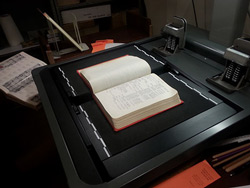The following news release is from FamilySearch:
SALT LAKE CITY, UT, April 13, 2015 — Imagine a free virtual online library of rare historical books from all over the world to help you discover rich, unknown details about the lives of your ancestors. What if the historical book collections held by significant public libraries and venerable societies were the sources of these contributed books? You’d have a dynamic, priceless online repository of some of the greatest hidden historical treasures in the world. A growing host of partnering libraries, other organizations, and volunteers have announced today that they’ve reached the milestone of publishing 200,000 historical volumes online for free at books.FamilySearch.org. The growing online collection, which began in 2007, is invaluable to genealogists and family historians in finding their ancestors.
FamilySearch has mobile digitization pods at partnering libraries and organizations across the United States, including Fort Wayne, Indiana; Syracuse, New York; Philadelphia, Pennsylvania; Independence, Missouri; Houston, Texas; Gainsville, Florida; and Salt Lake City, Utah. Digitization is also being done at FamilySearch centers in Pocatello, Idaho; Mesa, Arizona; Oakland, Orange, and Sacramento, California; and West Valley and Ogden, Utah. Most of the digitized publications consist of compiled family histories and local and county histories. The collection also includes telephone and postal directories and other resources.
A major player in this vast project is the Allen County Public Library, in Fort Wayne, Indiana. Allen County’s genealogical library is the second largest genealogical library in the world, containing one million physical items and 2.5 million searchable items in their free online databases. FamilySearch has three sets of volunteers filming at the library’s Genealogy Center. Over the past five years of the project, some 14,000 volumes have been filmed and digitized (an estimated two million pages). Allen County has an estimated 12,000 additional volumes that are immediately available for digitization—perhaps another five years of work.
Curt Witcher, the Genealogy Center manager at the Allen County Public Library, credits FamilySearch. “They’ve done a lot of the heavy lifting” in getting the project to this point, he observed. “Think of the collection that every library in the world now has accessible through this project. And there is no loss, no theft, no mutilation of materials.”
The Houston Public Library (HPL) is regularly ranked among the top 10 genealogical libraries. It joined the initiative in 2008. Sporting an extensive Gulf Coast family history and genealogical collection as well as an extensive international collection, HPL’s Clayton Library Center for Genealogical Research and the Houston Metropolitan Research Center have contributed so far nearly 8,700 volumes to the project. Sue Kaufman, manager of the Clayton Center, is quick to say what a pleasure it is to watch library-goers expand their research by being able simply to enter information about a name, date, and place to quickly search personal histories and stories from the digitized collection online.
The project has made books available to anyone with an Internet connection. And even though the historical books are becoming available online, foot traffic to the library has not decreased while the use of the online family history content has increased.
As with most of the digitization pods for this initiative, the digitization work at the Clayton Center is performed by full-time FamilySearch volunteers, although some locations are supported by local volunteers. Kaufman says, “I am humbled and honored to be part of this project. It is amazing what the FamilySearch volunteers do, closing their homes for 12 or 18 months to work 40 hours a week in a space that must seem the size of a closet. It is selfless. We couldn’t have done it ourselves.”
At the Historical Society of Pennsylvania (HSP), a unique, special collections library in the heart of Philadelphia, digitization efforts have been equally successful. According to Page Talbott, HSP President and CEO, they are planning to digitize 3,100 volumes of the society’s 12,000-volume family history collection. Over 110,000 pages (about 800 volumes) have been completed to date. Talbot characterizes the digitization initiative with FamilySearch as “fabulous” and sees vast potential for future projects.
HSP was established in 1824 and has 21 million manuscripts and 600,000 bound volumes. In addition to the family history collection, it holds collections of vital records, directories, business histories, and prison records. HSP collects histories of all states from the east coast to the Mississippi River, including ethnic and immigrant histories, and has collected historical newspapers in 57 languages.
To search the digitized records, go to books.familysearch.org, enter your ancestor’s name in the search box, and click Search.
Libraries or organizations interested in participating in the book digitization initiative can contact Dennis Meldrum, project manager at FamilySearch, at meldrumdl@familysearch.org.
